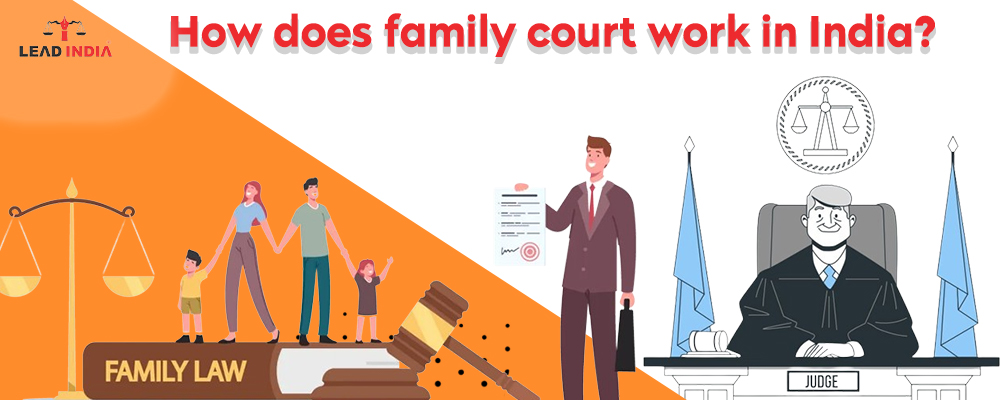In India, a specialized court called the Family Court is used to resolve cases involving family conflicts, such as divorce, child custody, alimony, and domestic abuse. The Family Courts Act of 1984 governs the operation of Family Courts, which were established to give a more considerate and rapid resolution to family disputes.
Jurisdiction and Types of Cases
Family Courts in India have jurisdiction over a range of family-related matters, offering an exclusive platform for the resolution of disputes arising from marriage and family relationships. These include:
Need A Legal Advice
The internet is not a lawyer and neither are you. Talk to a real lawyer about your legal issue

Divorce Proceedings
Family Courts are tasked with handling divorce cases, where couples seek legal dissolution of their marriage. Grounds for divorce may include cruelty, adultery, desertion, mental illness, or mutual consent.
Child Custody Matters
Issues related to the custody of children are frequently addressed in Family Courts. Determining the custodial rights and responsibilities of parents is crucial, and the court strives to ensure the child’s welfare is prioritized.
Alimony and Maintenance
Family Courts also decide on matters related to alimony and maintenance, ensuring that the financial needs of spouses and children are met post-divorce.
Domestic Violence Cases
The Protection of Women from Domestic Violence Act, 2005, empowers Family Courts to address cases of domestic violence. This includes granting protection orders, residence orders, and maintenance to victims.
Property Division
Disputes regarding the division of assets and property acquired during the marriage are resolved in Family Courts. The court aims to ensure an equitable distribution of marital assets.
Family Court Procedures in India
The procedures followed in Family Courts are designed to be more informal and accessible, fostering a conducive environment for open communication and resolution. The typical steps involved in family court proceedings are:
Filing a Petition
The process begins with the filing of a petition by the aggrieved party. The petitioner outlines the facts, grounds, and relief sought, specifying the nature of the dispute and the desired outcome.
Summoning the Respondent
Once the petition is filed, the court issues a summons to the respondent, notifying them of the legal proceedings. The respondent is given an opportunity to present their side of the case.
Counselling and Mediation
Family Courts in India emphasize the importance of reconciliation and mediation. In certain cases, the court may refer the parties to counselling or mediation services to explore the possibility of an amicable settlement.
Evidence and Witnesses
Both parties present their evidence and witnesses to substantiate their claims. This may include documents, testimonies, or expert opinions relevant to the case.
Final Arguments
After the presentation of evidence, both parties have the opportunity to make their final arguments before the court. This is the stage where legal representatives play a crucial role in presenting a compelling case.
Judgment and Decree
The court, after considering all the evidence and arguments, delivers a judgment. If the court grants a divorce or issues any other order, a formal decree is issued, outlining the terms and conditions of the decision.
Importance of Legal Representation
- While Family Courts encourage parties to represent themselves, legal representation is highly recommended, especially in complex cases.
- Lawyers specializing in family law provide valuable assistance in navigating the legal intricacies, ensuring that clients are well-informed and adequately represented during the proceedings.
- Their expertise is particularly beneficial in understanding the nuances of family laws, presenting a compelling case, and negotiating settlements.
Challenges and Concerns
- Despite its noble objectives, Family Courts in India face challenges such as a backlog of cases, limited resources, and societal perceptions.
- The backlog often leads to delays in the resolution of disputes, causing emotional and financial strain on the parties involved.
- Additionally, societal stigmas and biases can influence the proceedings, impacting the court’s ability to provide fair and impartial decisions.
- Efforts are being made to address these challenges, including the establishment of more Family Courts, training programs for judges and court staff, and public awareness campaigns to destigmatize family disputes.
In India, family courts are essential for resolving the particular problems that arise from family conflicts. These courts seek to guarantee equitable and just outcomes for all parties by offering a specialized venue with an emphasis on sensitivity and timeliness. Navigating the intricacies of family-related legal disputes requires an understanding of the processes, authority, and difficulties of Family Courts.
A more equitable and caring legal system for Indian families will result from ongoing efforts to increase the effectiveness and accessibility of Family Courts as the legal landscape changes.
One can talk to a lawyer from Lead India for any kind of legal support. In India, free legal advice online can be obtained at Lead India. Along with receiving free legal advice online, one can also ask questions to the experts online free through Lead India





 Talk to a Lawyer
Talk to a Lawyer